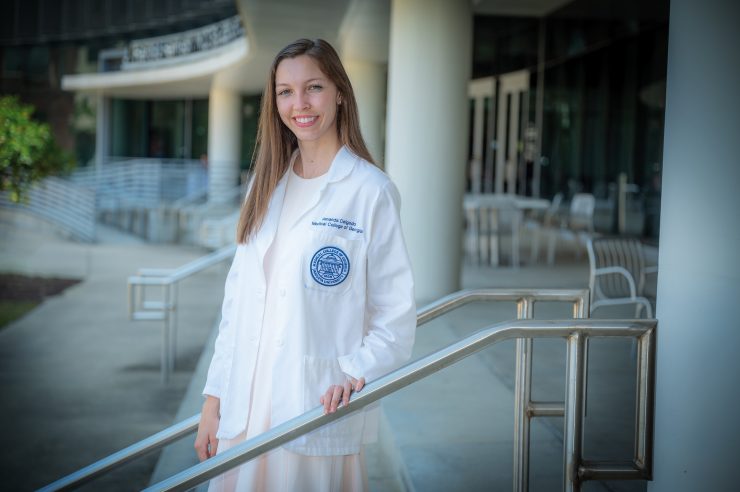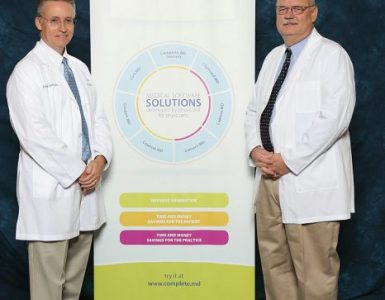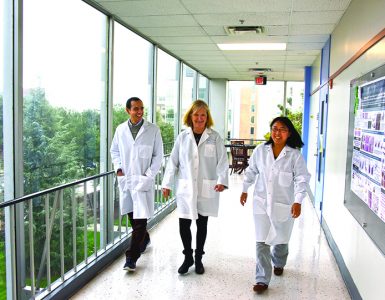How COVID changed my medical education
I was a first-year medical student when the COVID-19 pandemic put a halt to in-person learning MCG. The changes that disrupted our learning shaped my experiences in the classroom and hospital in obvious ways. However, the unique experience of training during the pandemic also subtly contributed to my interest in medical education and influenced my future career goals.
My earliest memories of the COVID-student experience start in March 2020 when our class was instructed to return home for a two-week hiatus to in-person learning. We quickly dispersed across the state to eventually complete the final months of our first year at MCG. This announcement was made during our brain and behavior module – a module which contained elements of head and neck anatomy dissections as well as neuroanatomy labs. Initial feelings of relief that came with the two-week pause in learning were quickly replaced by worries about studying for anatomy via a virtual platform. Concerns about access to technology and an exam enforced with virtual proctoring seemed insurmountable. In response, professors collaborated with student leadership – including myself as the VP of Curriculum for our class – to provide study sessions via Zoom, crowdsource high quality anatomy images for the exam, and establish a virtual proctoring system to ensure fair enforcement of the honor code. From early on, concepts of flexibility and adaptability drove the quick transition to virtual learning and led to little disruption to our pre-clinical education.
In Fall 2020, the next challenge which faced students was returning to campus safely to continue our second year of medical school. The second year was critical to developing our understanding of pathology while furthering clinical skills through in-person small group activities and standardized patient encounters in the simulation lab. In response to the pandemic, students were given the option to view lectures online or in-person. In hopes of combating the isolation I felt while studying alone from my hometown in Spring 2020, I chose to attend every class in-person. To my surprise, attending in-person introduced a new sense of isolation; the 200+ seat auditorium was often nearly empty with only 2-5 students showing up for in-person lectures each day. There were days I was the only student in attendance, making active participation mandatory. However, the kindness which I was met with by the professors was incredibly encouraging. During breaks between lectures, I was often asked for feedback about the module schedule or content delivery. It was evident that the MCG faculty were continually attempting to improve the student experience, even amidst the uncertainty of the pandemic.
Spring 2021 was an exciting time for my class. With the introduction of the COVID-19 vaccine, students felt safe to return to in-person learning and ready to focus on our clinical education which began in April 2021. Moreover, students jumped at the opportunity to volunteer at vaccine clinics to hone their rudimentary clinical skills while serving the community. I remember volunteering at one such clinic where we vaccinated teachers from a local school district; I was overwhelmed by a sense of gratitude now that I was finally able to contribute something to the medical efforts of the pandemic.
At the start of clinical rotations, my class was eager to do the same. However, our passion for helping others was quickly met by frustrating restrictions in the clinical setting. At the start of our rotations, students were deterred from visiting COVID-positive patients. This policy was a challenging barrier to overcome since at times, the patient census on some teams contained over 80% COVID-positive patients. The solution was once again online learning. For patient conditions we couldn’t see in-person secondary to the COVID restrictions, we were required to complete online modules describing patient cases. I personally found these interactions unengaging and more difficult to tie to academic content than in-person clinical encounters. Fortunately, attendings on many services took notice and took the time to present extra informal learning sessions to ensure our medical knowledge did not suffer.
By our fourth year of medical school in Spring 2022, the hospital seemed to return to a post-COVID state in many ways. Masking mandates were loosened, and patient lists had significantly fewer COVID-positive patients. My classmates and I hit the ground running to prepare for away rotations and residency applications. As I began to work on my personal statement for pediatric residency programs, I was forced to reflect on how the pandemic impacted my career trajectory. Despite the feelings of physical and emotional isolation that infiltrated my medical school experience, I felt reassured at each step of my medical training by the faculty and administration who worked tirelessly to ensure that the quality of our education was not compromised. Even today, I continue to think about the different ways in which medical education was adapted to meet our unique needs, and I am inspired to pay forward the education I received to future generations of medical students. Since graduating in May 2023 and starting my residency orientation, I am encouraged now more than ever that I will have the opportunity to use my unique experiences as a learner during the COVID-19 pandemic to guide my passion for medical education.
* During the Hooding Ceremony for the MCG Class of 2023, Dr. Lossner was awarded the Physician’s Physician Award, which is presented to graduating medical students who demonstrate the greatest aptitude for and devotion to the profession of medicine. MCG students vote for the classmate they would most likely seek out as a personal physician. Dr. Lossner started her pediatrics residency at Boston Children’s Hospital in July.









